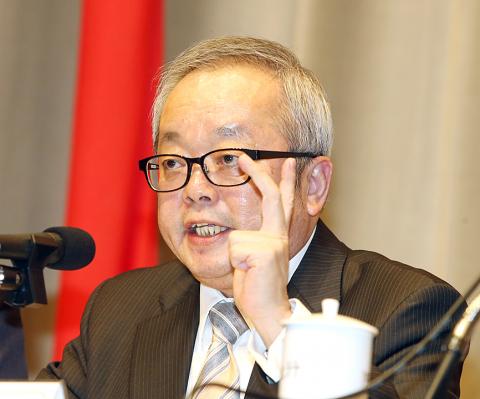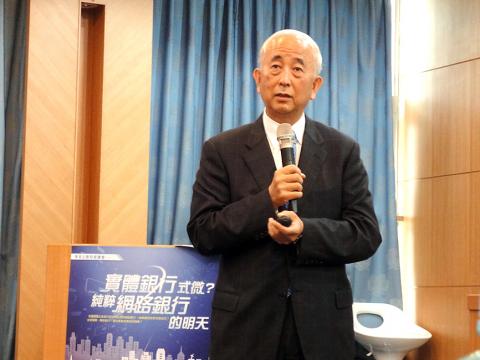State-run banks could lose up to NT$20.1 billion (US$665.97 million) for extending a loan to troubled Ching Fu Shipbuilding Co (慶富造船), the Cabinet said yesterday, adding that First Commercial Bank chairman Tsai Ching-nain (蔡慶年), who supervised the syndicated loan, would be removed.
However, there is no conclusive evidence of any political intervention in the loan decision, the Cabinet said.
Ching Fu, which was awarded a NT$35.8 billion contract to build six minesweepers for the navy as part of a domestic warship program, defaulted on a NT$20.5 billion syndicated loan, forcing nine banks to lose a combined NT$20.1 billion, an Executive Yuan report said yesterday.

Photo: CNA
The investigation revealed major dereliction of duty by the Ministry of National Defense and First Bank in awarding the contract and loan to the financially unstable company, Vice Premier Shih Jun-ji (施俊吉) said.
There were also suspicious money transfers to Ching Fu, and questionable communications between the Presidential Office and the Cabinet over the case, Shih added.
The ministry failed to ensure that Ching Fu had the financial capability to carry out the project; failed to ensure the company had the manufacturing ability; and failed to launch a negotiation process with China Fu and a potentially more qualified bidder, CSBC Corp (台船), before resorting to lots-drawing to decide the winner of the minesweeper tender, the report said.

Photo: Lu Kuan-cheng, Taipei Times
The ministry lowered the minimum asset requirement for potential bidders from NT$3.52 billion to NT$176.46 million, Minister without Portfolio Lo Ping-cheng (羅秉成) said.
It also neglected that Ching Fu had little ability to construct a shipyard for the minesweepers and awarded the project anyway, Lo said.
“Throughout the whole procurement process, the ministry gave the impression that it was biased toward Ching Fu and relaxed the rules,” Lo said.
According to the report, First Bank was also negligent in failing to ensure that Ching Fu had the financial and manufacturing ability before approving the loan.
While it required Ching Fu to complete a capital increase as part of its loan terms, the bank failed to demand an execution plan in advance, resulting in the bank’s approving an additional loan of NT$1.05 billion to help Ching Fu increase its capital.
“The bank opened its vault for Ching Fu to take the money away,” Shih said.
Tsai is to be removed due to negligence and the ministry has to report its planned disciplinary measures to the Executive Yuan, Shih said.
Meanwhile, Ching Fu transferred NT$4.93 billion of the loan money into five questionable accounts in Hong Kong, Macau and Singapore, which the company said were used to pay ship manufacturing costs, Shih said.
About NT$1.3 billion was transferred back from the overseas accounts to those of Ching Fu’s managers and subsidiaries in Taiwan, Shih said, adding that prosecutors are to investigate suspected money laundering or other illegal activities.
The Presidential Office on Sept. 1, 2015, under then-president Ma Ying-jeou (馬英九), issued a document to the Executive Yuan which included a letter by Ching Fu petitioning the government to assist the company in securing loans, the report said.
Former Executive Yuan secretary-general Chien Tai-lang (簡太郎) then convened two meetings with the banks to discuss the loan case in September and December that year, but Tsai said he was not under pressure to have First Bank lead the loan, Shih said.
“Although the investigation reveals [the actions of the Presidential Office and the Executive Yuan], it does not mean that we have determined there was interference by senior officials,” Shih said.
The Cabinet began the investigation on Oct. 17 and is to transfer the case to the judiciary for further investigation.
Meanwhile, President Tsai Ing-wen (蔡英文) yesterday said in the Solomon Islands that whether the government should transfer the minesweeper project to another shipbuilder or abort the project to upgrade the existing fleet depends on the navy’s evaluation.
“It has to be a professional decision rather than a political one,” she said.
Additional reporting by Chung Li-hua

AGING: As of last month, people aged 65 or older accounted for 20.06 percent of the total population and the number of couples who got married fell by 18,685 from 2024 Taiwan has surpassed South Korea as the country least willing to have children, with an annual crude birthrate of 4.62 per 1,000 people, Ministry of the Interior data showed yesterday. The nation was previously ranked the second-lowest country in terms of total fertility rate, or the average number of children a woman has in her lifetime. However, South Korea’s fertility rate began to recover from 2023, with total fertility rate rising from 0.72 and estimated to reach 0.82 to 0.85 by last year, and the crude birthrate projected at 6.7 per 1,000 people. Japan’s crude birthrate was projected to fall below six,

US President Donald Trump in an interview with the New York Times published on Thursday said that “it’s up to” Chinese President Xi Jinping (習近平) what China does on Taiwan, but that he would be “very unhappy” with a change in the “status quo.” “He [Xi] considers it to be a part of China, and that’s up to him what he’s going to be doing, but I’ve expressed to him that I would be very unhappy if he did that, and I don’t think he’ll do that. I hope he doesn’t do that,” Trump said. Trump made the comments in the context

SELF-DEFENSE: Tokyo has accelerated its spending goal and its defense minister said the nation needs to discuss whether it should develop nuclear-powered submarines China is ramping up objections to what it sees as Japan’s desire to acquire nuclear weapons, despite Tokyo’s longstanding renunciation of such arms, deepening another fissure in the two neighbors’ increasingly tense ties. In what appears to be a concerted effort, China’s foreign and defense ministries issued statements on Thursday condemning alleged remilitarism efforts by Tokyo. The remarks came as two of the country’s top think tanks jointly issued a 29-page report framing actions by “right-wing forces” in Japan as posing a “serious threat” to world peace. While that report did not define “right-wing forces,” the Chinese Ministry of Foreign Affairs was

PREPAREDNESS: Given the difficulty of importing ammunition during wartime, the Ministry of National Defense said it would prioritize ‘coproduction’ partnerships A newly formed unit of the Marine Corps tasked with land-based security operations has recently replaced its aging, domestically produced rifles with more advanced, US-made M4A1 rifles, a source said yesterday. The unnamed source familiar with the matter said the First Security Battalion of the Marine Corps’ Air Defense and Base Guard Group has replaced its older T65K2 rifles, which have been in service since the late 1980s, with the newly received M4A1s. The source did not say exactly when the upgrade took place or how many M4A1s were issued to the battalion. The confirmation came after Chinese-language media reported